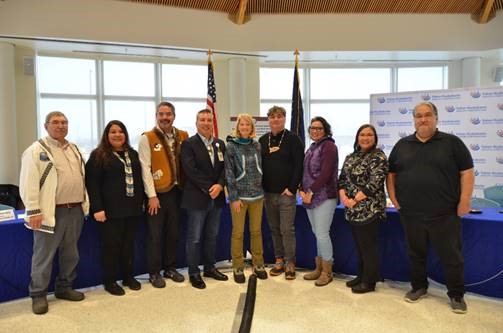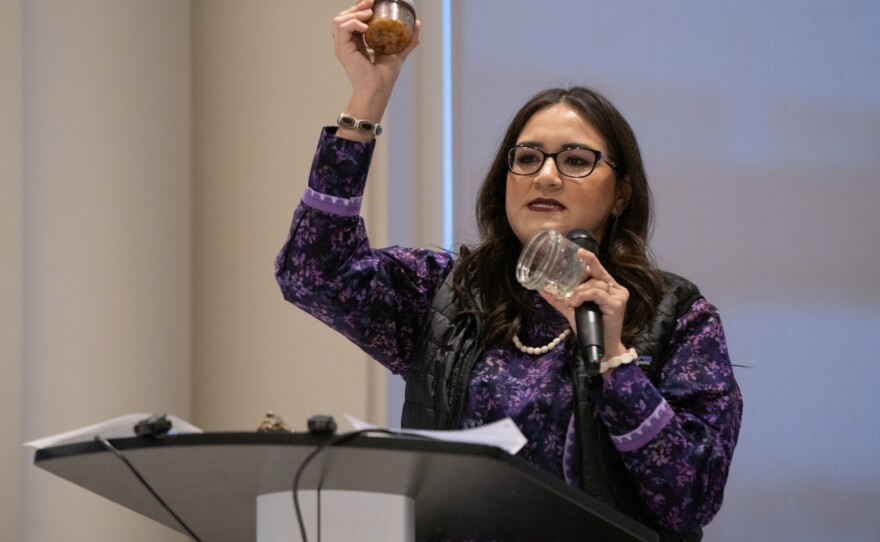Dozens Testify and Provide Public Statements From Yukon-Kuskokwim Communities and Call for Action to Address Salmon Declines
WASHINGTON, DC – U.S. Senator Lisa Murkowski (R-AK), Vice Chairman of the Senate Committee on Indian Affairs (SCIA), recently chaired a field hearing and public listening session in Bethel, Alaska on “The Impact of the Historic Salmon Declines on the Health and Well-Being of Alaska Native Communities Along Arctic, Yukon, and Kuskokwim Rivers.” The event was held at the Yukon Kuskokwim Health Corporation’s “Gathering Place.”
“It is significant and historic to bring the Senate Indian Affairs Committee to Bethel to understand how the salmon crashes in the Arctic-Yukon-Kuskokwim region are affecting those of you who live here,” said Vice Chairman Murkowski. “I have traveled through most of the villages in this region over the course of many years. I’ve been into many of the fish camps up and down the Kuskokwim and the Yukon. I have heard how the lack of salmon is affecting your ways of life and the need for the federal government to pay attention, to understand, and to act. We brought the Committee to Bethel so those in the region and surrounding villages who are most impacted can be heard and offer potential solutions on the official record.”

Pictured: Senator Lisa Murkowski with witnesses following SCIA field oversight hearing on November 10, 2023
For additional photos, click here.
The following witnesses testified at the field hearing:
- The Honorable Thaddeus Tikiun, Jr., Chairperson, Association of Village Council Presidents, Bethel, AK
- The Honorable Brian Ridley, Chief/Chairman, Tanana Chiefs Conference, Fairbanks, AK
- Mr. Jonathan Samuelson, Chair, Kuskokwim River Inter-Tribal Fish Commission, Bethel, AK
- Ms. Karma Ulvi, Chair, Yukon River Inter-Tribal Fish Commission, Fairbanks, AK
- Mr. Dan Winkelman, President and Chief Executive Officer, Yukon Kuskokwim Health Corporation, Bethel, AK
- Ms. Nicole Borromeo, Executive Vice President, Alaska Federation of Natives, Anchorage, AK
- Ms. Tisha Neviq’aq Kuhns, Vice President of Land and Natural Resources, Calista Corporation, Anchorage, AK
- Mr. Charles Menadelook, Subsistence Director, Kawerak, Inc., Nome, AK
Vice Chairman Murkowski underscored some of the goals of the hearing and listening session. “Traditional ecological knowledge must inform our actions and decisions,” said Vice Chairman Murkowski. “I am interested to hear more from our witnesses about how we can strengthen co-management relationships and help improve the federal subsistence management program.”
Vice Chairman Murkowski asked witnesses, when they do not have salmon, what do they do, given the high cost of living?
“I had an elder talk to us from our region who said they lived through the Great Depression, but they didn’t even know there was a Great Depression, because we had all that we needed,” said Chief/Chairman Ridley. “We had all the fish and game that we needed. I’m seeing the economy the way it is, the cost of living, and all the issues that we are dealing with. And if our people had the fish and game and all those things, we’d have full freezers, and all those things about the economy wouldn’t even matter. But that’s not the case.”
Vice Chairman Murkowski asked witnesses about the impact on young people.
“The provider role in our communities is so important,” said Chair Samuelson. “When we are forced to deviate from our traditional ways of life, it only amplifies our unwellness. Our way of life and our cultural knowledge and the way that we are in the world is our path to wellness. We know that. When we’re forced to go off that track and we have no means to get back to wellness, we end up with things like mental illnesses, suicide, physical unwellness. […] It all comes back to the fish. It’s at the heart of it. So our people really suffer when everything is not in balance.”
During the listening session, Vice Chairman Murkowski heard from more than 30 individuals who addressed the Committee on the record.
Ray Oney from the village of Alakanuk described the importance of salmon.
“The salmon is who identifies us as people of the Yukon River. And as you heard, many a times we haven’t had an opportunity to subsist or even to put salmon on the table, even to taste. I recall when the elders heard that they were going to be allowed to harvest Chinook salmon, the elders cried. They relied on that resource from their ancestors, from their parents and their ancestors that taught them that way of living. Because that was the only way of living that we knew,” said Ray Oney.
Nick Andrew from Bethel and Marshall described the significance of salmon.
“We come from the Yukon Kuskokwim Delta region, the size of Oregon. Everything’s up in the stratosphere here where we live. The cost of living, crime, violent crime, all the disparities in the book are here. I am a hunter, fisher, and gatherer. I was born into a culture that prioritized food and shelter. Food meant salmon. It meant smoked salmon. It meant salted salmon, salmon in the freezers. […] People in my village, the fish camps are empty. The cultural activity that involves family is gone, meaning cutting salmon, preparing salmon, spending time with family, sharing with the elders – that has been broken. There was a time, our world was complete, when the rivers were teeming with salmon on both rivers. Our people were happy. Not only the people, but the animals that rely on the salmon were also happy. We need some answers. We need to be heard,” said Nick Andrew.
Tim Andrew from Bethel described the cultural value of salmon.
“I’ve seen all these cultural values that people are fighting to retain our salmon, retain our cultural way of life, return to sharing our salmon that we harvest, with our elders, with the people that we feed. All we want to do is accommodate our guests. All we want to do is feed our families. All we want to do is continue with our ceremonies. The beat of the drum is common through the entire area. All the Native people in Alaska want to beat that drum, beat that drum of sharing our salmon resources,” said Tim Andrew.
Joseph Asuluk Sr. of Toksook Bay spoke in Yup’ik and issued a call to action.
“It’s too much. That’s enough. On the Yukon and Kuskokwim, it’s not the people’s fault. Think about it. Think about it. […] Lisa, you have to fight for us. We believe in you. Let’s wake up. Let’s wake up, become one voice. We won’t always be alive. Our children and our great grandchildren – let’s leave some salmon for them,” said Joseph Asuluk Sr.
Nikki Pollack from Bethel spoke about the salmon declines and impacts to health.
“I’m Yup’ik from the river. I have a background in nursing. I graduated in 2010 from the University of Anchorage as a registered nurse. I’ve been a lifelong Kuskokwim fisher woman, subsistence gatherer. I’m a mother. I’ve spent my entire life on the river just like many of us here. I want to speak to the disparities that are affecting our people particularly our health and well-being. I want to talk about the amounts necessary for subsistence. This jar is what we now use to put our jarred fish away. In our family, our fish camp alone has six families that we feed. This is a jar that we used we used to use about 10 years ago. We used to use larger jars. I don’t have any of those anymore because we don’t use them in our family because there is simply not enough fish to go around. It’s no surprise that there are direct correlations with health consequences and increasing insecurity for food, housing, and economics,” said Nikki Pollack.

Pictured: Nikki Pollack (Photo Credit to KYUK)
Gabe Canfield from the Yukon River Drainage Fishers Association shared the importance of the youth perspective.
“The first thing that we see and hear from this crisis is the physical effects, the actual tangible results of not having salmon in our rivers. We don’t see birds, bears, wolves, and animals alongside the banks of our rivers whenever there’s a salmon crash. We don’t see our neighbors in fish camps. And we don’t see our children cutting fish. We don’t see the salmon bright pink bellies and we don’t see the smoke rising from the smoke house and the scented dry fish filling the air. We don’t see the kings, chums and cohos that have been coming for a hundred generations or more. We can see the cultural costs and impacts of this. We see less of our traditional foods in our homes, less potlucks and gatherings, less fish camps, less fish skin arts and handicrafts that we adorn throughout our lives. We see mental health impacts from not practicing our culture and falling into harmful habits that have taken up our time. We see monetary costs in our community members who spend their own money to get more expensive and less valuable foods,” said Gabe Canfield.
At the end of the Listening Session, Vice Chairman Murkowski thanked everyone who shared.
“I want to share with you my deep appreciation, because for some of you the comments that you shared are very deeply personal and that you were willing to share them is very meaningful,” said Vice Chairman Murkowski. “I’ve also heard that the traditional knowledge that you bring to the table has led long before much of the science or the actual management actions that come. We need to be paying attention to that aspect of knowledge that you bring to the table. You have given me a great deal to consider here today along with my staff. I want to be able to report back. I owe it to those of you who’ve come, those of you who have spoken, those who have just listened, those who are living with the reality that your way of life is being threatened right now. And as Vivian [Korthuis] reminded us all at the beginning, your way of life matters. Know that I carry that with me back to Washington, DC. Thank you for the time that you’ve given me and know that together we’ve got some work to do.”
For thousands of years, salmon have been critical to the survival of the people in the Arctic-Yukon-Kuskokwim region. However, low Chinook and chum salmon runs in the Yukon and Kuskokwim river systems have led to restrictions on commercial and subsistence fisheries, causing severe hardship to Alaska Native communities in this region.
To read witness written testimony, click here. And to watch the field hearing and listening session, click here.
-###-
